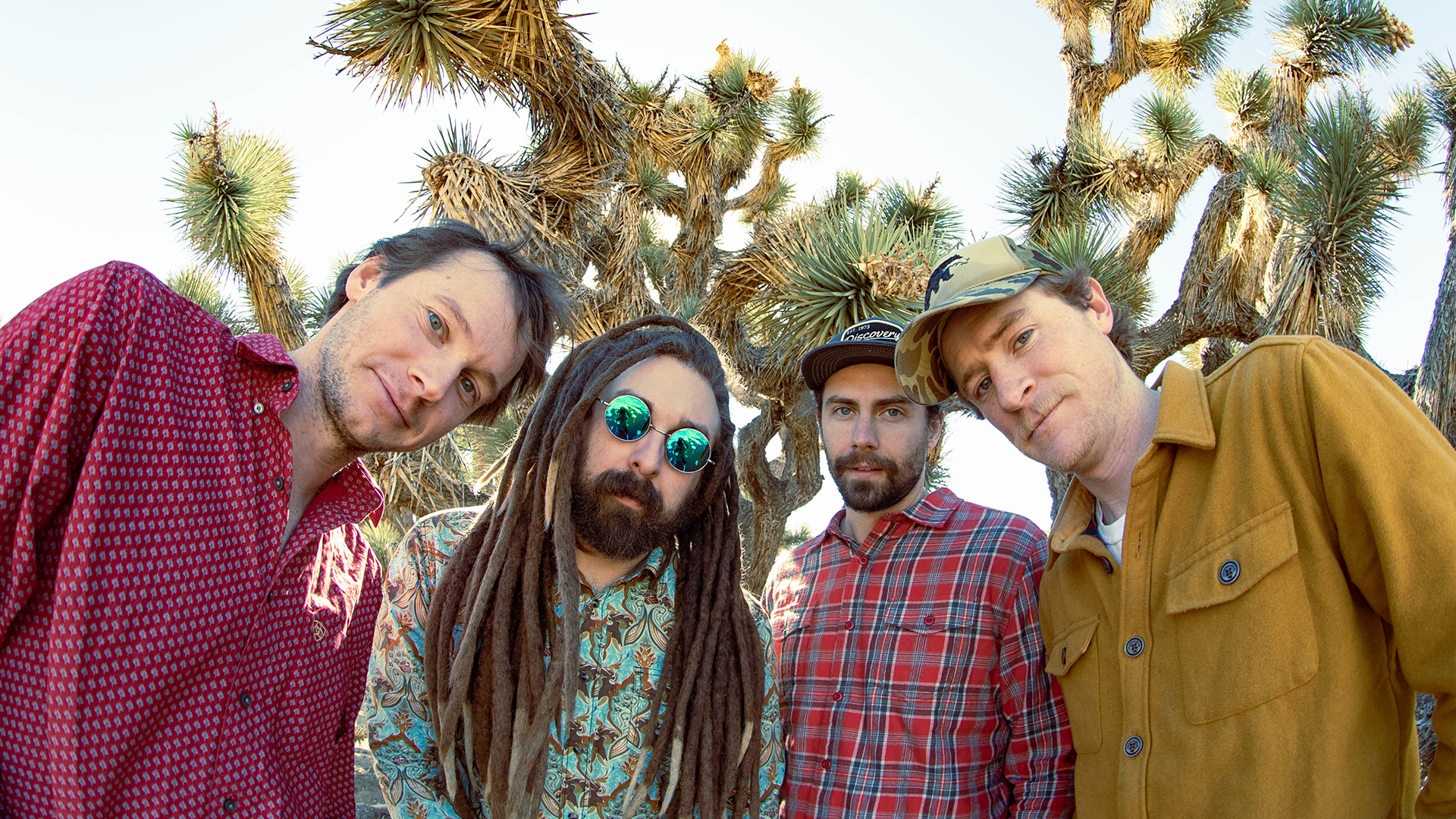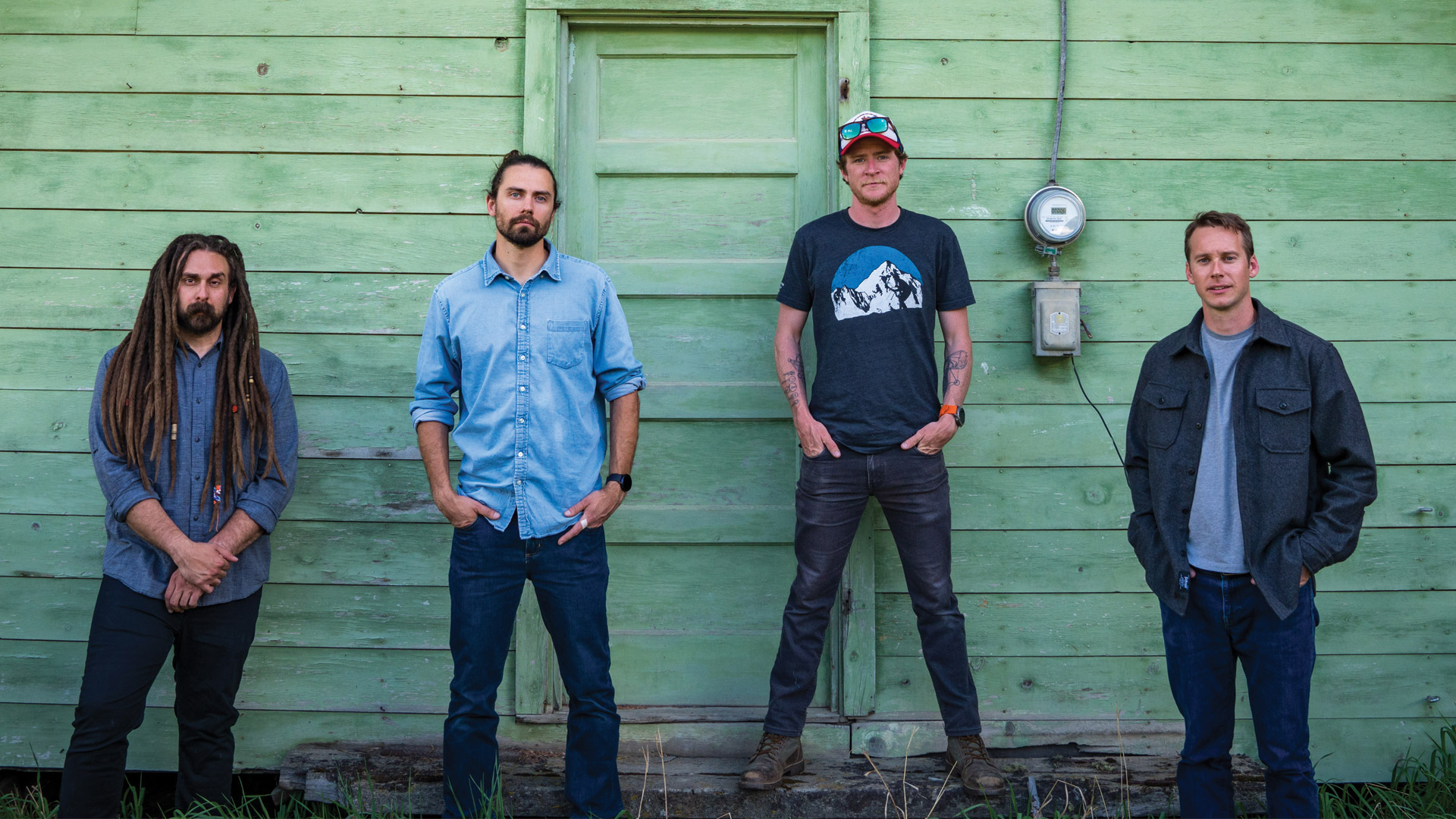Beloved Montana-based bluegrass quartet Kitchen Dwellers makes the music God dances to with the Devil. In that dance is life itself, sin and salvation swirling around each other eternally. Their music is the long road ahead crunching beneath your steps, the warm summer wind blowing through wild grass, the rain dripping down your spine. It’s the regrets of lives once lived coupled with the hope inherent in the future, the first brush of a lover’s thigh against your cheek and the last harsh words that echo through your mind for years to come. Their songs feel as if they have existed deep in the hearts of man for time immemorial, stories etched into our collective history that will continue to be told until time runs out.
Kitchen Dwellers’ new album, Seven Devils, out March 1st, which draws parallels with Dante Alghieri’s epic poem Inferno, continues this timeless feeling with songs that feel like delving through hell in search of love. 303 Magazine recently spoke with Joe Funk, standup bass player for Kitchen Dwellers, about the new album, the band’s history, the band’s love of Denver and Colorado as a whole, and more.
READ: Review — Denver Came Alive with Bluegrass, Metalgrass, and Aliengrass Galore
Funk grew up in southeastern Alaska, the rural environment of which he said “played a big part in [his] upbringing.” It was here in those frigid early years that Funk was introduced to music. He said his mother put him in guitar lessons “when [he] was about 3 or 4 years old.” He went to a charter elementary school that had biweekly violin classes. After playing and becoming acquainted with the instrument for a time, he eventually switched over to bluegrass fiddle, which he called “his start.” All this happened before middle school, a musical foundation to build upon solidified earlier than most.
Funk’s first introduction to the standup bass came in middle school, where he played in the school’s symphony. He chose the standup bass because “it was the only instrument [he] couldn’t take home because it was too big.” While Funk didn’t love the symphony, the conductor was also a stand-up bassist and actually the guitar teacher who had taught Funk when he was 3 or 4. Funk began taking private bass lessons with the conductor, who introduced him to jazz playing. Funk says he “owes” these lessons and the conductor himself “a lot for [his] musical upbringing.” These lessons were where Funk was taught about improv and “led [him] around the fretboard without sheet music” for the first time. He said he still draws on lessons learned from this period to this day.
After playing in rock bands with friends in high school, Funk left Alaska for Montana to study engineering. While at school, he met Kyle Shelstad, who would eventually become Kitchen Dwellers first guitarist. During this period, Funk said he “never considered [himself] a musician,” which is surprising given his extensive musical background. He was in school to become an engineer, not join a band. But it’s funny how fate plays out. Nevertheless, Funk said, “[Being a musician] was always in the back of my mind as ‘that would be the best thing to happen in my life.'”
Funk and Shelstad began playing as a duo “for fun” before being joined by Shawn Swain, who would become Kitchen Dwellers’ mandolin player. They played as a trio for a while, writing songs and playing small shows for friends. Along the way, Swain introduced the other guys to Torrin Daniels, Kitchen Dwellers’ banjo player. “The rest is history,” Funk said.
Over the course of the next four years, the band slowly grew in popularity, which led Funk to realize that he could actually pursue music as a career. He described this realization as confounding in a way, saying that at the time, “[he] wasn’t sure [they] were that good.” Still, he began noticing that it wasn’t just friends showing up to shows but rooms were being filled with unfamiliar faces: they were building a dedicated fan base. Funk said, “I realized I might be doing this professionally because of our friends and fans who really believed in us.” He attributes the fan base growing in those early years to “emotion that [the band was] able to portray through music.” This emotion has carried the band through the rocky early years to this very day. A Kitchen Dwellers show is unlike a traditional bluegrass show. They leave every ounce of their souls on each stage they play. Their music tends to defy genre convention, the passion and breakneck energy with which they play having been interpreted as metal as much as bluegrass, leading to them being classified by many as “metalgrass.” Funk’s low-end contributions are a major factor in this classification as the band wouldn’t be able to quite reach the soul-rattling heights they do without Funk holding it down.
This emotion has carried the band through the rocky early years to this very day. A Kitchen Dwellers show is unlike a traditional bluegrass show. They leave every ounce of their souls on each stage they play. Their music tends to defy genre convention, the passion and breakneck energy with which they play having been interpreted as metal as much as bluegrass, leading to them being classified by many as “metalgrass.” Funk’s low-end contributions are a major factor in this classification as the band wouldn’t be able to quite reach the soul-rattling heights they do without Funk holding it down.
The band eventually worked their way up to recording a project with Shelstad acting as a sort of “front man,” as Funk described him. The project was experimental, a testing of the waters. Shelstad ended up parting ways with the band in 2014 and was replaced with Max Davies on acoustic guitar. While that early project “isn’t really available anywhere” anymore, it did serve to inform later recording experiences. In 2017, after nearly eight years of being a band, three with the new lineup, Kitchen Dwellers released their first full-length album, Ghost in the Bottle.
While Ghost in the Bottle served to include the band in the national bluegrass conversation, Kitchen Dwellers had already begun to make a name for themselves outside of Montana in the years leading up to its release. Swain grew up in Telluride and brought the band to Colorado to play bars near bluegrass festivals, hoping to catch fans following such legends as The String Cheese Incident and Yonder Mountain String Band. These early Coloradan roots have only grown, and Kitchen Dwellers is now one of the most sought-after tickets in bluegrass in a state that truly loves the genre, with Funk describing Colorado as “truly a second home.” They even co-headlined “Denver Comes Alive” with Yonder last year, their name now entwined with bands they grew up on.
In the seven years since Ghost in the Bottle was released, the band has come out with two more full-length albums, two live albums, a slew of singles and EPs, and have toured countless nights, acquiring new fans with each note they play. It’s all led to their latest effort, Seven Devils. It’s an incredibly confident record, each song a journey into different recesses of the human psyche. Some songs, such as “Waterford Son” — which features Lindsay Lou — are beautifully traditional bluegrass tales, but the band’s willingness to defy genre convention also stands out. There are songs such as “Here We Go,” also featuring Lindsay Lou, that have full drums on them and keys as well. There are strange, otherworldly sounds strewn throughout the album, creating a psychedelic, out-of-time kind of feel. While the album spans a variety of sounds, the songs found on Seven Devils feel etched into the soul as if you’ve known them since before you were born.
Each song on Seven Devils carries a Roman numeral subheading ranging from I-VII, with the notable exceptions of the eponymous “Seven Devils” and album ending “Unwind” carrying (Limbo) and (Paradiso), respectively. This comes from Dante Alghieri’s Inferno, one of the most important works of the Western literary canon. For those who may not know, Inferno is the first of three parts that make up Alghieri’s The Divine Comedy, the other two parts being Purgatorio and Paradiso. First published in the mid-1300s, it tells the story of Alighieri as he searches the afterlife for his fallen love, Beatrice. Guided by the poet Virgil, he first descends through the seven layers of hell — each layer representing one of the Seven Deadly Sins — learning about the failings of man and their consequences as he searches.
It seems a lofty idea for a bluegrass album. Actually, according to Funk, the Alighieri theme was actually applied after the album had mostly been finished. Daniels, Funk said, noticed the parallels and convinced the band to see them as well. While applying a mid-12th-century Italian epic poem to a rollicking bluegrass album might seem a bit of a stretch in theory, when you think about it, it makes total sense. Inferno deals with timeless themes that also recur in much of bluegrass music. Themes of love lost too soon, the willingness to go through hell seek it out once more and the heartache that can come from such a journey have formed the basis of bluegrass music since the genre was in its infancy. Inferno speaks of the Seven Deadly Sins, the base weaknesses of man. What is bluegrass if not finding ways to contend with the weaknesses in us all and turn them into strength, sorrow into joy? When examined, the parallels are evident. It just took a band as insightful and storied as Kitchen Dwellers to recognize them.
Artists such as Joe Funk and his bandmates serve as reminders that the lack of certainties in this life is what makes it so damn beautiful. The stories Kitchen Dwellers tell range from sorrowful to bursting with joy which feeds into the idea of sin and salvation, different sides of the same coin, joy unable to exist without sorrow, and vice versa. God and the Devil dance in each of our hearts, our joys and sorrows serving as their tunes. But in that joy and sorrow also exists time and memory, paths once followed to destinations that live on in your heart but you may never visit again. The passage of time also denotes the future, and for as much anguish and soul-tearing that’s found on Seven Devils, there is an equal amount of hope. The road stretches out in front of all of us, beckoning. Following it may take you through hell, but keep stepping forward and heaven may be waiting on the other side.







